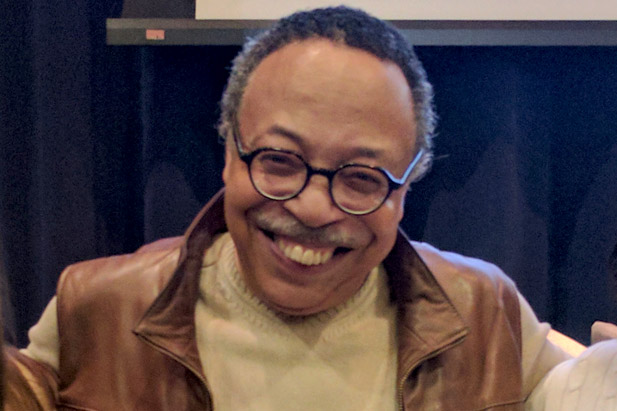Faculties team up to host Canadian Parliamentary Poet Laureate
Campus visit by Dr. George Elliott Clarke helps celebrate Black History Month
March 7, 2017

Figuratively and literally, a Poet Laureate has a way with words. On February 27, the University of Ontario Institute of Technology discovered this in real life as Dr. George Elliott Clarke, Canada’s Parliamentary Poet Laureate shared a selection of his works at a Black History Month celebration. The special event combined the organizational resources of the university’s Faculty of Social Science and Humanities, and Faculty of Education.
The 2001 Governor General’s Award for Poetry recipient and Officer of the Order of Canada is highly sought for his scholarship and compelling speaking skills. During a remarkable and memorable performance at the Regent Theatre, Dr. Clarke demonstrated his sharp wit and his brilliant talent for bringing his prose to life before a large audience.
Dr. Clarke writes about contemporary social awareness issues and offers poignant observations on a range of topics surrounding identity, racism, discrimination and segregation. He challenges his audiences to think deeply about where we are today as a society and consider whether we have harnessed knowledge from the teachings of history.
Growing up in Nova Scotia, he proudly calls his home community ‘Africadians’, drawn from the combination of the words Africa and Acadia. Dr. Clarke stresses his formal Parliamentary role is strictly non-partisan, but he is not afraid to share passages from his politically tinged writings of the past. Nor does he hesitate to mix in his sense of humour and playfulness as he performs at the lectern.
Dr. Clarke cites many of the great intellectuals, authors and poets of the 1960s as sources of inspiration, drawing many parallels from that turbulent yet liberating period with the events of today. He painted a vivid mosaic of Black History in Ontario and across Canada through a few dozen readings that drew many spontaneous bursts of applause and laughter. He also took time to answer questions from the audience, offering perspective on the contributions of Black Canadians, summarizing the advances that have been achieved and speaking frankly on the challenges that remain.
Quotes
“Black History Month is a time to celebrate and honour the achievements and contributions of Black Canadians, both past and present–an opportunity to raise awareness about the challenges confronting peoples of African descent and promote understanding of their contributions to the human experience. Dr. Clarke’s visit to campus was an opportunity to celebrate our diversity and the legacies of Black Canadians, recognizing the integral role they have played in the formation of a more inclusive, democratic and diverse Canada.”
-Brian Cutler, PhD, Interim Dean, Faculty of Social Science and Humanities
“The Faculty of Education was thrilled to co-sponsor this year's Black History Month celebration with the Faculty of Social Science and Humanities. We wish to congratulate all the volunteers and community members who participated in this, the first public university event for Black History Month. The selection of Dr. George Elliott Clarke was inspired and he was inspiring.”
-Michael Owen, PhD, Dean, Faculty of Education
Facts:
- Carter G. Woodson (born in Virginia in 1875 to former slaves, just 10 years after the abolition of slavery in the United States) earned bachelor’s and master’s degrees from the University of Chicago. He would receive a PhD in history from Harvard University in 1912. Dr. Woodson is often referred to as “The Father of Black History.” He formed the Association for the Study of Negro Life and History, and in 1916, he founded the Journal of Negro History—both of which, incidentally, still exist. In 1926, Dr. Woodson founded Negro History Week, which was celebrated in February.
- Why February? February 14 was the birthday of Frederick Douglass, the charismatic African-American leader of the 19th century who freed himself from the shackles of slavery and tirelessly campaigned for the freedom of others. February 12 was the birthday of Abraham Lincoln, the American president who, in 1865, signed the Emancipation Proclamation, which emancipated African-American slaves from legal bondage.
- Canada’s Black community is diverse, with some communities more than 300 years old. Black Canadians have experienced and resisted slavery, colonialism, the colour bar, discriminatory immigration policies, employment and economic disadvantage. Today Black Canadians are over-represented in arrest and prison incarceration statistics, child welfare seizures, and disproportionate high school push-outs.
- The dispossession of Indigenous people in Canada and the Americas set the stage for the Trans-Atlantic slave trade and the enslavement of Africans in the New World. African Canadians, more than any other non-Indigenous group, have been present in Canada from the beginning of British and French conquest and colonialism.
- The first Black family presence in Durham Region was in East Whitby, according to the 1852 Census of Canada West. The census listed 17 people out of the population of 8,479 (0.2 per cent).
- Beginning in 2018, Canada’s $10 bill will feature the face of Viola Desmond, a Nova Scotia woman who challenged racial segregation at a movie theatre in 1946 and unjustly convicted of a minor tax violation. Desmond died in 1965. She received the first posthumous pardon in Canadian history in 2010. The Government of Nova Scotia also apologized for the wrongful prosecution.



